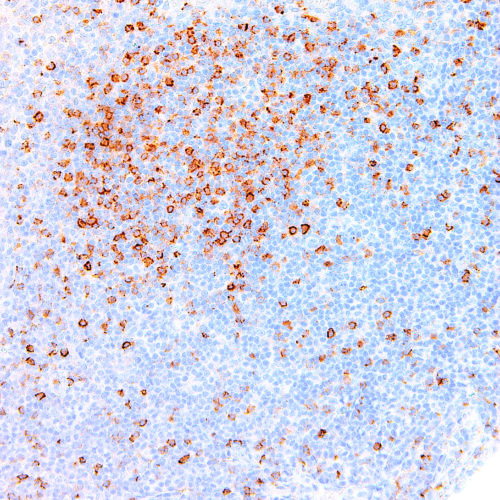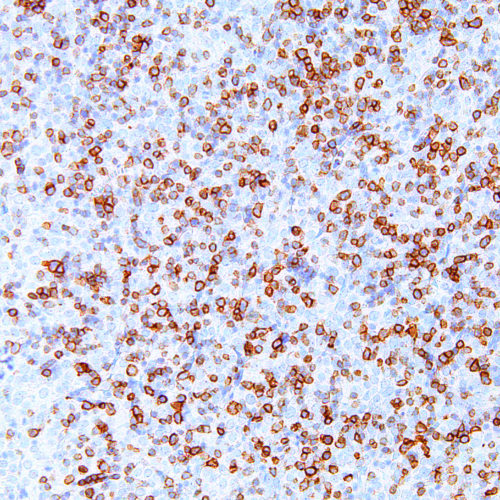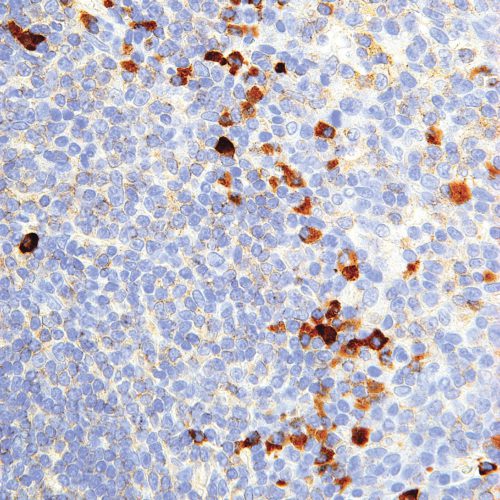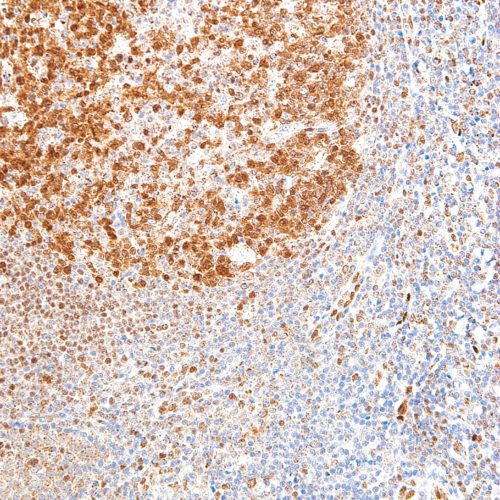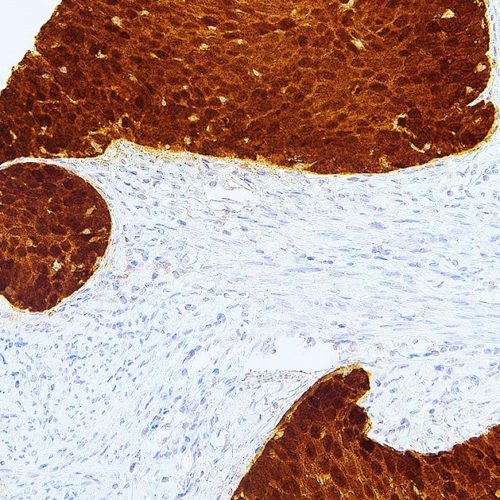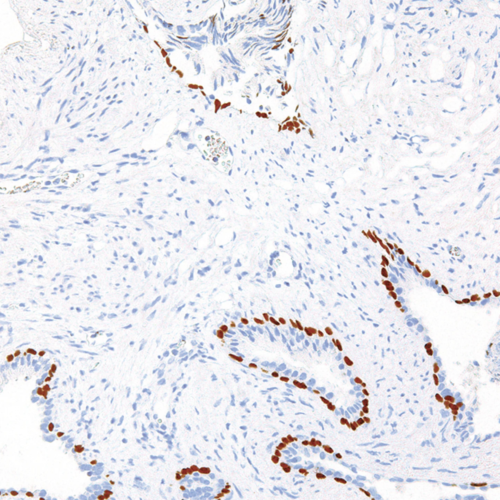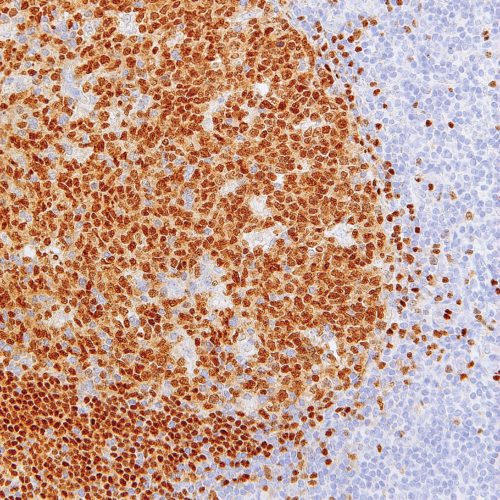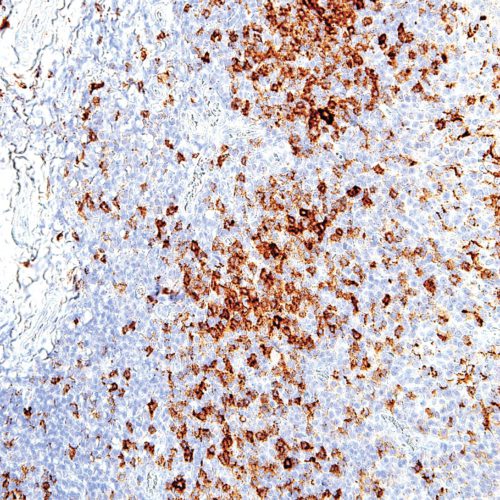High quality products to support Pathologists and Biological and Environmental Scientists
GeneAb™ Hairy Cell Leukemia
$150.00 – $680.00Anti-Hairy Cell Leukemia stains various B-cells in the follicular mantle zone and virtually all cases of hairy cell leukemia. It also stains some high grade B-cell lymphomas.
GeneAb™ hENT1
$170.00 – $785.00The Human Equilibrative Nucleoside Transporter 1 (hENT1) mediates the cellular uptake of physiologic nucleosides, including adenosine, as well as many anti-cancer drugs including gemcitabine, cytarabine, and decitabine. Deficiency of hENT1 can lead to resistance of such drugs, and the abundance of hENT1 protein in the plasma membrane is a major indicator of the efficiency and clinical outcome of these anti-cancer nucleosides.
GeneAb™ Kappa
$35.00 – $140.00Anti-Kappa recognizes surface immunoglobulin on normal and neoplastic B-cells, and has been indicated as a potential aid in the identification of leukemias, plasmacytomas, and certain non-Hodgkin’s lymphomas, where the expression of a single light chain class is restricted. The determination of light chain ratio is critical in evaluating B-cell neoplasms, as the majority of B-cell lymphomas express either kappa or lambda light chains, while a mixture of kappa and lambda is characteristic of reactive proliferations. In paraffin-embedded tissue, Anti-Kappa displays strong staining of kappa-positive plasma cells, as well as cells that have absorbed exogenous immunoglobulins.
GeneAb™ LMO2
$110.00 – $500.00LMO2, also known as LIM-Only transcription factor 2, RBTN2, or TTG2, is an oncoprotein that is expressed in normal germinal center B-cells, as well as bone marrow hematopoietic precursors and endothelial cells. LMO2 plays a role in angiogenesis and hematopoesis, and its expression has been detected in erythroid and myeloid precursors, megakaryocytes, and also in lymphoblastic and acute myeloid leukemias. LMO2 protein expression has been noted in diffuse large B-cell lymphoma, the most common adult non-Hodgkin lymphoma, as well as follicular lymphoma, a neoplasm derived from germinal center B-cells that accounts for a number of cases of non-Hodgkin lymphomas.
GeneAb™ p16 INK4A
$135.00 – $545.00The p16 (p16INK4A) protein is a cyclin-dependent kinase inhibitor that plays an important regulatory role in the cell cycle. By controlling the transition between the G1 and S phases through regulation of retinoblastoma protein, p16 decelerates cellular differentiation and therefore acts as a tumor suppressor, making it the key marker in several human cancers including head and neck cancer, perianal lesions, melanomas, gliomas, lymphomas, and some types of leukemia. p16 is also clinically indicated in carcinomas of the esophagus, pancreas, lung, biliary tract, liver, colon, and urinary bladder.
GeneAb™ p63
$170.00 – $850.00p63 is a tumor suppressor protein that is very similar to p53 in structure and function, while being homologous to p73. p63 is important in development and differentiation, and has been identified as a useful marker for distinguishing between lung squamous cell carcinomas and adenocarcinomas. Anti-p63 is also used to differentiate between benign and malignant prostate and breast lesions, due to its labeling of the nuclei of myoepithelial cells in both tissue types.
GeneAb™ PAX-5
$50.00 – $255.00PAX-5 is a member of the paired box (PAX) family of transcription factors, which are key regulators in early development. The PAX-5 gene encodes the B-cell lineage specific activator protein (BSAP), whose expression is limited to early stages of B-cell differentiation. Anti-PAX-5 is useful in differentiating between classic Hodgkin’s lymphoma versus multiple myeloma and solitary plasmacytoma, as the protein is expressed in mature and precursor B-cell non-Hodgkin’s lymphomas/leukemias while being absent from the other two conditions. Diffuse large B-cell lymphomas are positive for PAX-5, with the exception of those with terminal B-cell differentiation, and T-cell neoplasms do not stain with Anti-PAX-5.
GeneAb™ PD-1
$70.00 – $280.00Programmed Death 1 (PD-1) is a member of the CD28/CTLA-4 family of T-cell regulators, expressed as a co-receptor on the surface of activated T-cells, B-cells, and macrophages. New studies have suggested that the PD-1/PD-L1 signaling pathway may be linked to anti-tumor immunity, as PD-L1 has been shown to induce apoptosis of activated T cells or inhibit activity of cytotoxic T cells. In comparison to CD10 and Bcl-6, PD-1 is expressed by fewer B cells and has therefore been considered a more specific and useful diagnostic marker for angioimmunoblastic T-cell lymphoma. Therapies targeted toward the PD-1 receptor have shown remarkable clinical responses in patients with various types of cancer, including non–small-cell lung cancer, melanoma, and renal-cell cancer.
